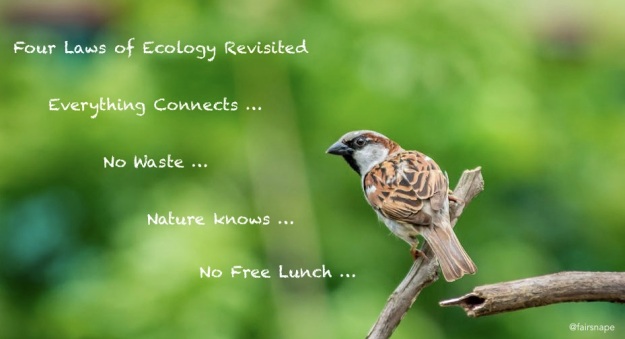
I undertook the task earlier this week of reviewing references for our upcoming RESTORE working group publication {Sustainability, Restorative to Regenerative}. One of those references was to Barry Commoner’s popular quote and definition on ecology, that the first law of ecology is that everything is connected.
This lead me to pick up a copy and re-read deeper into Commoner’s 1971 The Closing Circle and revisit the Four Laws of Ecology. The Closing Circle describes the ecosphere, how it has been damaged, and the economic, social, and political systems which have created our environmental crises. It gives us a clear and concise understanding of what ecology means that is evermore relevant today.
And timely, Commoner’s second law – everything must go somewhere – resonates with a comment I gave to our local Lancashire Evening Post on plastic pollution. (We need to We need to be critically questioning single use plastics and acutely aware of plastics impact on health and the environment – and be aware of what happens when we throw plastic away – as really, there is no ‘away’)
The First Law of Ecology: Everything Is Connected to Everything Else. There is one ecosphere for all living organisms and what affects one, affects all. “When we try to pick out anything by itself, we find it hitched to everything else in the universe.” John Muir
The Second Law of Ecology: Everything Must go Somewhere. There is no “waste” in nature and there is no “away” to which things can be thrown. Any waste produced in one ecological process is recycled in another. A core principle for the Circular Economy.
The Third Law of Ecology: Nature Knows Best. Humankind has fashioned technology to improve upon nature, but any human change in a natural system is, says Commoner, “likely to be detrimental to that system” And in the context of chemicals of concern we are looking to eradicate from buildings (through eg the ILFI Red List) “The absence of a particular substance in nature, is often a sign that it is incompatible with the chemistry of life”
The Fourth Law of Ecology: There Is No Such Thing as a Free Lunch. Exploitation of nature, will always carry an ecological cost and will inevitably involve the conversion of resources from useful to useless.
The four laws warn that every gain is won at some cost. Because our global ecosystem is a connected whole, any impact, anything extracted from nature by human effort must be replaced. There is no avoidance of this price and delay only creates the ecological disruption and biodiversity loss we are witnessing.
This reinforces statements I make so often in presentations (see Specifi Edinburgh and RESTORE Budapest for example) and within FutuREstorative, that sustainability is the point at which we start to give back more than we take, and that we no longer have the luxury to just reduce our impact but we have delayed too long to do more good to rebalance the ecosystem equilibrium.

